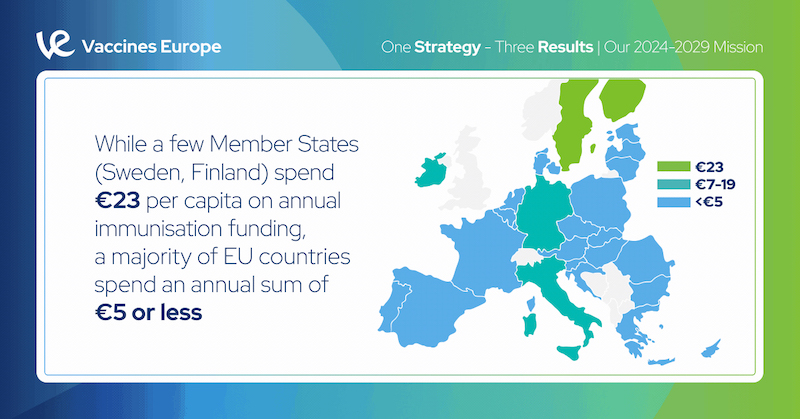
An EU Immunisation Strategy: making Europe more resilient
Vaccination is critical to our health security infrastructure, laying the foundation for a more innovative, healthier, prosperous Europe, writes Sibilia Quilici, Vaccines Europe Executive Director.
The world has witnessed the critical importance of immunisation, playing a pivotal role in eradicating and significantly reducing diseases in improving health in Europe and around the globe, and in helping to fight pandemics. Nonetheless, the current geopolitical situation is a stark reminder that immunisation constitutes a component of national security which deserves dedicated financing and accountability.
Over the course of the last couple of years, the COVID-19 pandemic has demonstrated the importance of robust public health systems. The world we operate in has changed, revealing the vaccine industry to be a critical feature of Europe’s health security infrastructure.
However, given the major challenges the EU is facing today – including a rapidly ageing population, the climate emergency, conflict at its borders, economic pressures and inflation, declining science literacy and trust in institutions – it is easy to overlook how vital strong immunisation policies are. Yet, many of the challenges we face are interconnected with the spread and rise of existing and new infectious diseases.
We are now entering a momentous phase in the history of pharmaceutical policy in the EU with the legislative debates around the European Commission’s General Pharmaceutical Legislation about to start in the coming months.
This revision represents a unique opportunity to strengthen our healthcare systems, by giving prevention policies, including immunisation policies, a more prominent place.
Immunisation must be at the heart of building more resilient and sustainable health systems, serving as a powerful tool that prevents sickness, saves lives, saves money and contributes to strong growth and strong communities.
In the words of Charles Michel, President of the European Council, speaking about the next strategic agenda, the European Union “must be equipped with general political directions and priorities to ensure lasting prosperity for the benefit of its citizens, (…) starting by consolidating the EU’s economic and social base with the green and digital transitions, competitiveness, innovation, health as priority areas”.
This is why Vaccines Europe, representing the innovative vaccine industry in Europe, calls on European lawmakers to put in place an EU Immunisation Strategy.
By backing new vaccines research and development and strengthening protection against vaccine-preventable diseases across all generations, this strategy can help build an innovative, healthy and prosperous Europe.
“We know that immunisation can bring incredible benefits to our societies, but the fact is that we are currently not realising its full potential. In the next mandate, we must put our learnings into action for a more resilient Europe through stronger immunisation policies and targets”, stresses Sibilia Quilici, Executive Director, Vaccines Europe.
An EU Immunisation Strategy: One Strategy – Three Results
Immunisation is paramount for building more resilient and sustainable health systems. It is an investment that delivers innovation, health, and prosperity.
An innovative Europe
Vaccine innovation is the foundation that will enable both health and economic gains and help us to be one step ahead of public health threats. Discovering and developing safe and effective vaccines relies on an innovative research, development and manufacturing ecosystem with robust and predictable intellectual property protection frameworks. Regulatory agility is needed to support faster acceptance of changes in manufacturing processes and more unified packaging, including e-leaflets.
To boost its defences against infectious diseases, Europe needs robust surveillance and e-health systems with interoperable databases for collecting epidemiological data, monitoring vaccine coverage rates, collecting/tracking data on vaccine confidence, and generating high-quality real-world evidence to inform immunisation policy.
This is why the EU Immunisation Strategy focusses on promoting forward-thinking policies that foster innovation, including the establishment of a framework for transparent, inclusive and regular exchange between all relevant stakeholders in decision-making.
Immunisation shields us from diseases and disabilities from the moment we are born until the late stages of life, through paediatric, adolescent and adult immunisation programmes.
It safeguards public health by protecting everyone against vaccine-preventable diseases. It contributes to preventing antimicrobial resistance. It helps to keep both adults and elderly with weakening immune systems healthy and active, thus contributing to society and the economy whilst easing the growing pressure on health systems.
A Healthy Europe
However, vaccines alone do not protect against illness. Vaccination does.
To ensure vaccine uptake and protection, it is time to put life-course immunisation targets in place. Combined with robust monitoring, this will help guarantee that all people in the EU, regardless of their socio-economic situation or age, wherever they live or travel, get the same level of protection.
A Prosperous Europe
High vaccination rates contribute to economic and social prosperity. They help workforces stay healthy and productive and contribute to economic growth. However, many do not get the vaccines they need, and national immunisation programmes face delays in including new vaccines in their schedules. Because only a very small percentage of national healthcare budgets go to prevention; with a minute proportion – only 0.5% – going to immunisation. If we are to improve immunisation rates to cope with a growing and ageing population, the EU must set appropriate financial targets to increase financing of national immunisation programmes. Europe’s Member States should invest in prevention via immunisation.
An innovative Europe is a healthier Europe. A healthier Europe is a more prosperous Europe. These are the pillars of a resilient European Union.
We call on the EU to put in place an EU Immunisation Strategy in the next mandate that strengthens protection against vaccine-preventable diseases across all generations.




